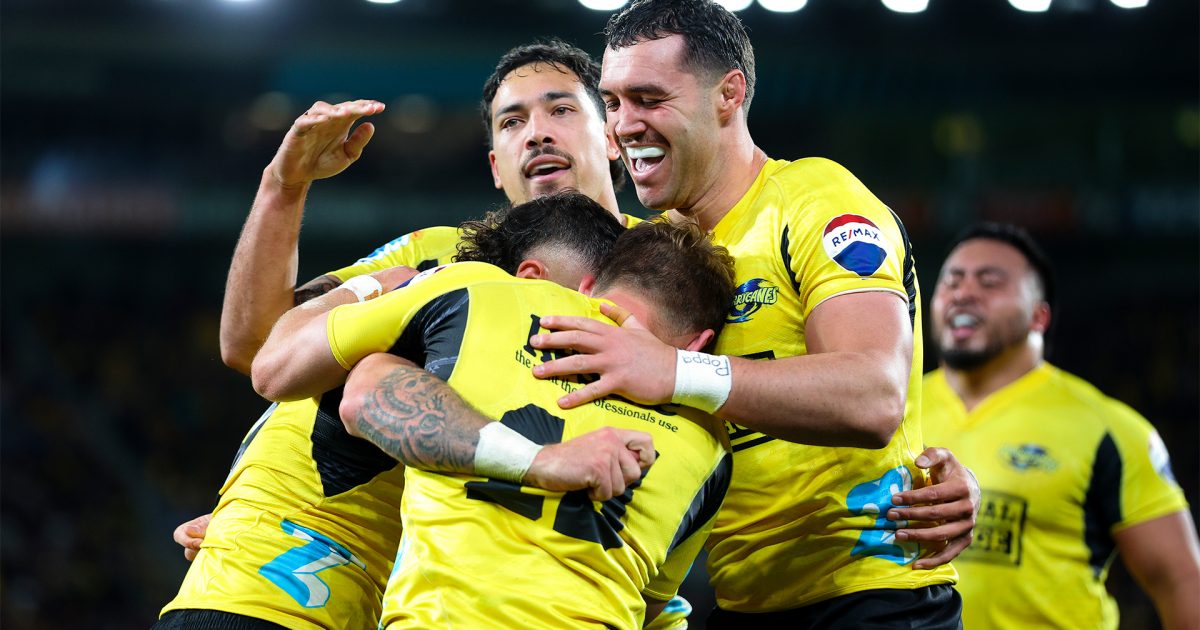Hurricanes send powerful message with dominant win over Chiefs

The unbeaten Hurricanes hosted the preseason title favourites in the Chiefs in what promised to be the biggest clash of the 2024 Super Rugby Pacific season to date in round eight.
The contest certainly lived up to that billing as well, as Wellington fans were treated to 80 minutes of brilliance from their team which extended their unbeaten run to seven in 2024.
The Chiefs’ defensive line was organised but the Hurricanes’ big ball runners were winning the collision area and securing the breakdown well early.
The Hurricanes’ powerful front row won the first scrum battle of the game, handing Brett Cameron a chance to open the scoring. The first five-eighth claimed the three points for the early lead.
Strong and dynamic carries from Brayden Iose, Ruben Love, Josh Moorby and Jordie Barrett all tested the Chiefs’ defence in the opening 10 minutes, and while the visitors hung on, it was looking dangerous.
Jordie Barrett’s decision-making and skillset at the line was impressive early, as was the Hurricanes’ front row, which won further penalties in the second, third and fourth scrums of the match, which all happened in quick succession.
Off the back of the ensuing scrum, Iose picked the ball up and was stopped just inches shy of the chalk, only for TJ Perenara to come in and opportunistically push the ball forward for the first try of the game.
The hosts wouldn’t be ahead by 10 for long though as Damian McKenzie faked a kick that opened up a gap for Rameka Poihipi to run onto, and like any great halfback, Cortez Ratima was waiting in support. The youngster had his pass knocked back by Brett Cameron and in an opportunistic moment of his own, recollected the loose ball and found himself running under the posts.
The Hurricanes’ phase play continued to be relentless and dominant, with forwards and backs alike providing deft touches and strong carries.
In one play, an Asafo Aumua try was reversed, Shaun Stevenson was taken from the field with a shoulder injury and Emoni Narawa was handed a yellow card for an offside infringement. Just a minute later, Iose launched off the back of another dominant scrum and landed over the try line. The score was then 17-7 with half an hour played.
The Hurricanes’ defence was impressive but their discipline was lacking and Damian McKenzie was able to chip away at that lead with a couple of penalties, sending the teams into the sheds with a 17-13 scoreline favouring the Hurricanes.
The Chiefs retained possession throughout scrappy exchanges to start the second half, with young No. 8 Wallace Sititi impressing with numerous carries that displayed agility and physicality. The play resulted in another penalty kick for McKenzie to make it a one-point game.
It looked to be a tale of two halves as the Chiefs furthered their momentum and found a rhythm on attack. Josh Ioane’s playmaking outside McKenzie came to the fore as Emoni Narawa was put away to score untouched.
The game opened up as the Hurricanes looked to fight their way back into the contest. The Chiefs’ lineout started to cause real havoc as Naitoa Ah Koui continued his fine work before being replaced with 25 minutes remaining.
The Hurricanes went back to their strength, phase play attack, and showed no shortage of confidence despite losing momentum. The offload game was ambitious and TJ Perenara stayed with the play, ready to receive the final pass which eventually came his way for the halfback to fly over the line and finish the play.
The Hurricanes’ forwards continued to play like the numbers on their backs were more of a mild suggestion than a rule, with exceptional skillsets on display across the park.
The cohesion, effort and skillset of the Hurricanes then produced a try for Kini Naholo with 13 minutes remaining and again four minutes later as Asafo Aumua bullied his way through a number of covering defenders.
The Hurricanes machine was firing on all cylinders as the lead was stretched to 36-23, where it would remain for the rest of the contest.



































































































